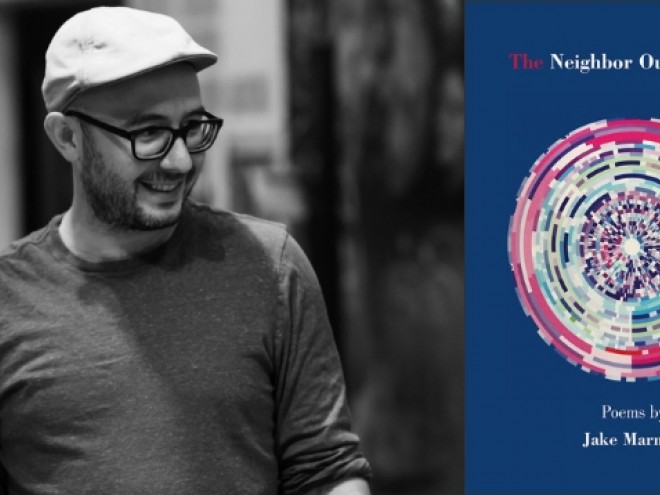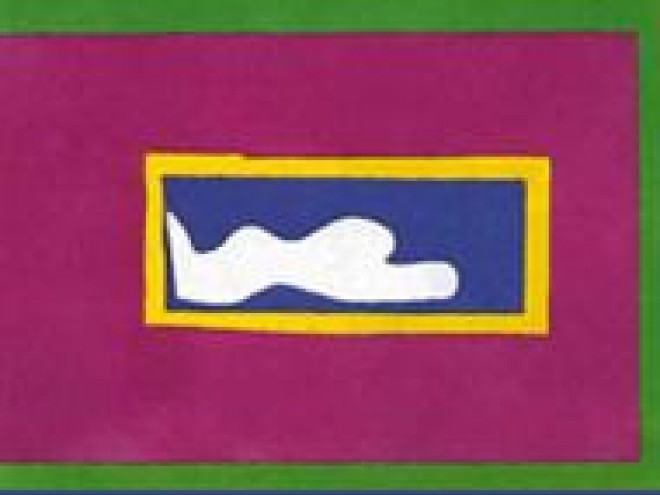Jake Marmer’s excellent new volume of poetry is a ranging meditation on big themes like parenthood, work, immigration, spirituality, and Judaism — examined through the lens of daily life. In poems like “Sermon Over the Empty Dishwasher,” Marmer explores, with both playfulness and seriousness, clashes and concordances between contemporary life and tradition.
Marmer’s poems tend to take the form of unpunctuated observations, but there are several innovative experimentations with form in this volume as well. The poem “Goldberg Agitations” is a poetic revision of a rejection note to a musician. The shortest poem in the book, titled “Portrait,” is reminiscent of a spontaneous yet sophisticated line drawing. It reads, in full:
she starts crying
& drains my glass
her own glass untouched
half-full
In brief prose passages that precede each section, Marmer places the ensuing poems in autobiographical and intellectual contexts.
The poems in the book’s first section play cannily on the notion of the nigun, “a traditional Hasidic chant, usually wordless,” Marmer explains, that “is a way of echo-locating yourself in the void.” In these poems, Marmer creates a sense of a vocal, wordless prayer through poetic language, using repetition, image, and mystery. Marmer’s short, sonically rich lines in these poems suggest attempt, rather than certainty. In “Painters’ Nigun,” for example, Marmer writes,
this song commemorates what
has never happened
but the paint the paint
rolls like walls rolls like sea
A poem in the book’s second section, “Ingress,” evokes two authors of the book’s epigraphs, Jacques Derrida and Emily Dickinson, while also riffing off a line from the Babylonian Talmud. “What can’t be imagined / bypasses reality, / then swallows it, from within,” writes Marmer, channeling Dickinson’s poetics and Derridean philosophy without losing his sense of humor.
One of Marmer’s most timely themes is his experience immigrating to the United States from the Ukraine. This theme winds through each of the book’s sections, but is most explicitly discussed in a prose section late in the book, introducing a series of poems in which Marmer draws on the Russian language he grew up speaking. Such poetic intermingling, Marmer writes in the introductory note, cuts against the grain of deep habit: “When it comes to writing, my reflex, by now entirely naturalized, is to edit out every trace of the mother-tongue. I am not proud of this reflex.” Considering the psychic and psychological effects of living in a new language, Marmer wonders, “Is self-loathing the required toll, exacted from each and every immigrant by assimilation’s demands?”
Marmer’s learned, vivid book concludes with a section that examines workplace boredom and alienation with humor and humanity. As Marmer points out, the workplace was a favorite subject of Kafka’s — and yet it remains woefully underexplored in literature, particularly poetry, given how much of our lives many of us spend in the workplace. This final section, which departs in topic and tone from the rest of the book, and the beauty of the prose sections throughout, hints at Marmer’s facility with a broad range of topics and genres. It will be interesting to see where that facility leads him in future books.
Lucy Biederman is an assistant professor of creative writing at Heidelberg University in Tiffin, Ohio. Her first book, The Walmart Book of the Dead, won the 2017 Vine Leaves Press Vignette Award.




